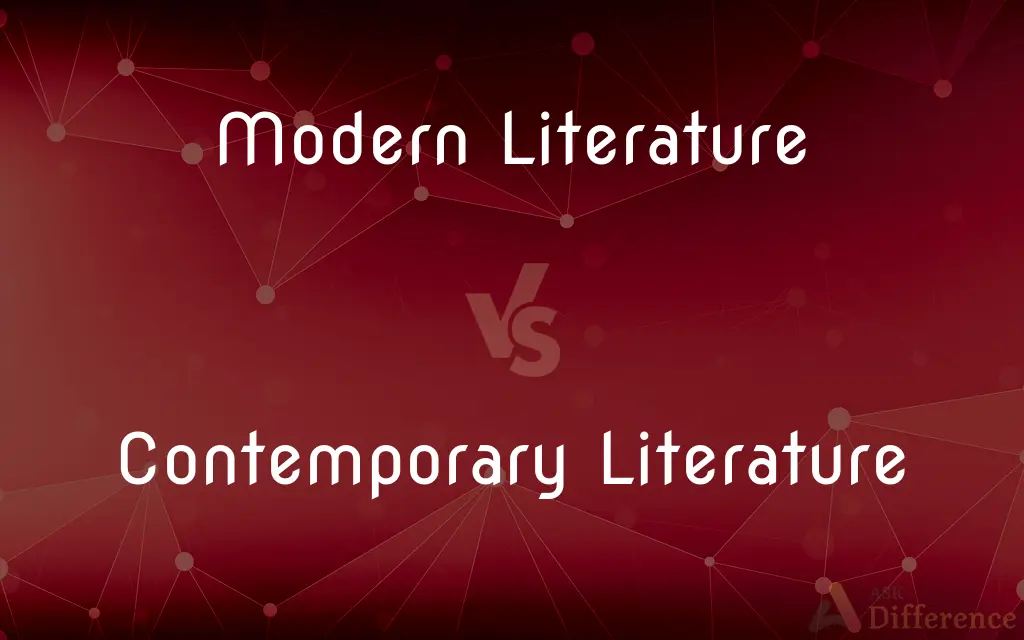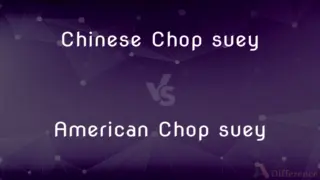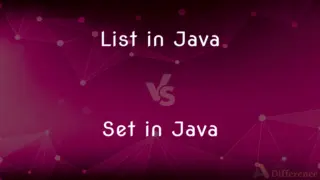Modern Literature vs. Contemporary Literature — What's the Difference?
By Tayyaba Rehman — Published on January 4, 2024
Modern Literature means works produced roughly between the late 19th and mid-20th centuries, characterized by a break from traditional styles. Contemporary Literature means works written from the mid-20th century to the present, reflecting current issues.

Difference Between Modern Literature and Contemporary Literature
Table of Contents
ADVERTISEMENT
Key Differences
Modern Literature typically refers to the period from the late 1800s to the mid-1900s, known for its experimentation with form and narrative techniques. Contemporary Literature begins where modern literature ends, around the mid-20th century, and continues to the present, often dealing with more current themes and diverse perspectives.
The themes in Modern Literature often include industrialization's impact, World War I and II's disillusionment, and the exploration of the subconscious. Contemporary Literature frequently explores globalization, technology's impact, identity politics, and postmodern skepticism.
Stylistically, Modern Literature is marked by stream of consciousness, fragmented narrative, and a departure from linear storytelling. In contrast, Contemporary Literature often embraces a variety of styles, including but not limited to minimalism, magical realism, and expanded narrative techniques.
Modern Literature includes authors like James Joyce, Virginia Woolf, and T.S. Eliot, who challenged existing literary norms. Contemporary Literature features a range of authors like Margaret Atwood, Haruki Murakami, and Chimamanda Ngozi Adichie, who address more recent social and cultural issues.
Modern Literature is characterized by its reaction to the rapid changes of its time, including urbanization and war. Contemporary Literature, on the other hand, reflects an increasingly globalized, digitized, and interconnected world.
ADVERTISEMENT
Comparison Chart
Time Period
Late 1800s to mid-1900s
Mid-1900s to present
Themes
Industrialization, war, existentialism
Globalization, technology, identity
Stylistic Features
Stream of consciousness, fragmentation
Variety of styles, postmodernism
Notable Authors
James Joyce, Virginia Woolf
Margaret Atwood, Haruki Murakami
Cultural Context
Reaction to rapid societal changes
Reflection of a globalized world
Compare with Definitions
Modern Literature
Literature from the late 19th to mid-20th century.
T.S. Eliot's 'The Waste Land' is a quintessential work of Modern Literature.
Contemporary Literature
Employs various styles, including minimalism and magical realism.
Magical realism has become popular in Contemporary Literature.
Modern Literature
Characterized by experimental forms and narratives.
Modern Literature often challenges traditional plot structures.
Contemporary Literature
Literature from the mid-20th century to the present.
Zadie Smith's novels are an example of Contemporary Literature.
Modern Literature
Marked by a break from classical storytelling.
Modern Literature introduced new ways of looking at narrative.
Contemporary Literature
Addresses current themes like technology and globalization.
Contemporary Literature often explores the impact of the digital age.
Modern Literature
Often uses techniques like stream of consciousness.
Stream of consciousness in Modern Literature mimics human thought.
Contemporary Literature
Reflects a diverse range of voices and perspectives.
Contemporary Literature includes a wider diversity of authors.
Modern Literature
Reflects themes of disillusionment and fragmentation.
Modern Literature frequently portrays the chaos of the World Wars.
Contemporary Literature
Engages with current cultural and social issues.
Climate change is a frequent topic in Contemporary Literature.
Common Curiosities
Can Contemporary Literature include science fiction?
Yes, contemporary includes a wide range of genres, including science fiction.
Is Modern Literature the same as contemporary?
No, they are distinct periods with different styles and themes.
Are Modernist works difficult to understand?
They can be, due to their experimental and often fragmented nature.
Is diversity a key feature of Contemporary Literature?
Yes, Contemporary Literature often includes diverse voices.
Does Contemporary Literature address global issues?
Yes, it often deals with global and current societal issues.
Was Modern Literature influenced by World Wars?
Yes, the World Wars had a significant impact on Modern Literature.
Are autobiographies part of Contemporary Literature?
Yes, autobiographies can be considered part of Contemporary Literature.
Are Modern Literature themes still relevant?
Many themes, like existentialism, remain relevant.
Did Modern Literature reject traditional forms?
Yes, Modern Literature was known for its experimental approach.
Did Modern Literature focus on urban life?
Yes, urbanization and its effects were common themes.
Did Modern Literature include stream of consciousness?
Yes, this was a popular technique in Modern Literature.
Can a work be both Modern and Contemporary?
Generally, works are categorized into one period based on their publication date and characteristics.
Is internet literature considered Contemporary?
Yes, internet-based literature is part of Contemporary Literature.
Is magical realism more common in Contemporary Literature?
Yes, magical realism is a notable feature of Contemporary Literature.
Does Contemporary Literature include postmodern works?
Yes, postmodernism is a part of Contemporary Literature.
Share Your Discovery

Previous Comparison
Chinese Chop suey vs. American Chop suey
Next Comparison
List in Java vs. Set in JavaAuthor Spotlight
Written by
Tayyaba RehmanTayyaba Rehman is a distinguished writer, currently serving as a primary contributor to askdifference.com. As a researcher in semantics and etymology, Tayyaba's passion for the complexity of languages and their distinctions has found a perfect home on the platform. Tayyaba delves into the intricacies of language, distinguishing between commonly confused words and phrases, thereby providing clarity for readers worldwide.
















































